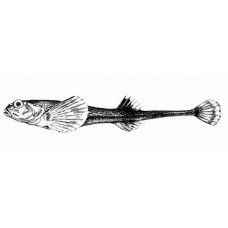Latin name
Aspidophoroides olrikii
Other name
Aspidophoroides olrikii
Identification
The head of the Arctic alligatorfish is large and broad. There are short antennae on the upper jaw. They have relatively large eyes that help them see at great depths and in murky water.
Features of fish fins
Dorsal spines (total): 0; Dorsal soft rays (total): 5 - 7; Anal spines: 0; Anal soft rays: 5 - 7.
The caudal fin of this species is rounded. The dorsal and anal fins are set back. The pectoral fins are large.
Fish colouring
The head and body of the Arctic alligatorfish are brownish-gray on top, with several darker cross-stripes or spots. The underside of the body is pale. A blackish-brown stripe runs obliquely downward through the gill cover from the eye. A spot of the same color is present above the base of the pectoral fin and at the beginning of the caudal fin.
Distribution
This species is found in the Arctic, northwestern Atlantic, and northwestern and northeastern Pacific, including Canada, Greenland, Siberia, the Barents Sea, the White Sea, the Kara Sea, the Chukchi Sea, the Bering Sea, the Bering Strait, and Anadyr Bay.
Habitat
It is a marine fish that lives in brackish water, at depths from 7 to 520 meters. It lives bottom dwelling, mostly at temperatures below 0°C, but in rare cases they have been found at 2-3°C, at salinities of 30-35%.
Size
Males can reach a maximum total length of 8.6 centimeters, but are usually found no longer than 7 centimeters.
Behavior
Arctic alligatorfish are often found near sandy or muddy bottoms.
Food and feeding habits
The diet of these fish consists of amphipods such as Dyopedos porrectus and Paradulichia typica, bivalves such as Macoma calcarea, ostracods, isopods and ribbon worms.
Reproduction
Not much is known about the sexual reproduction of this species, but it is confirmed that they lay a maximum of about 250 eggs at a time, which is very low compared to many other species.
Fishing
This species is not commercially important.
Relationship with a person
Harmless.
| Classification | |
| Phylum | Chordata |
| Class | Actinopterygii |
| Squad | Perciformes |
| Family | Agonidae |
| Genus | Aspidophoroides |
| Species | A. olrikii |
| Features | |
| Conservation status | Not Evaluated |
| Habitat | Bottom |
| Life span, years | No information |
| Maximum body weight, kg | No information |
| Maximum length, cm | 8,6 |
| Sailing speed, m/s | No information |
| Threat to people | Edible |
| Way of eating | Planktonophage |
Arctic alligatorfish
Tags: arctic alligatorfish

